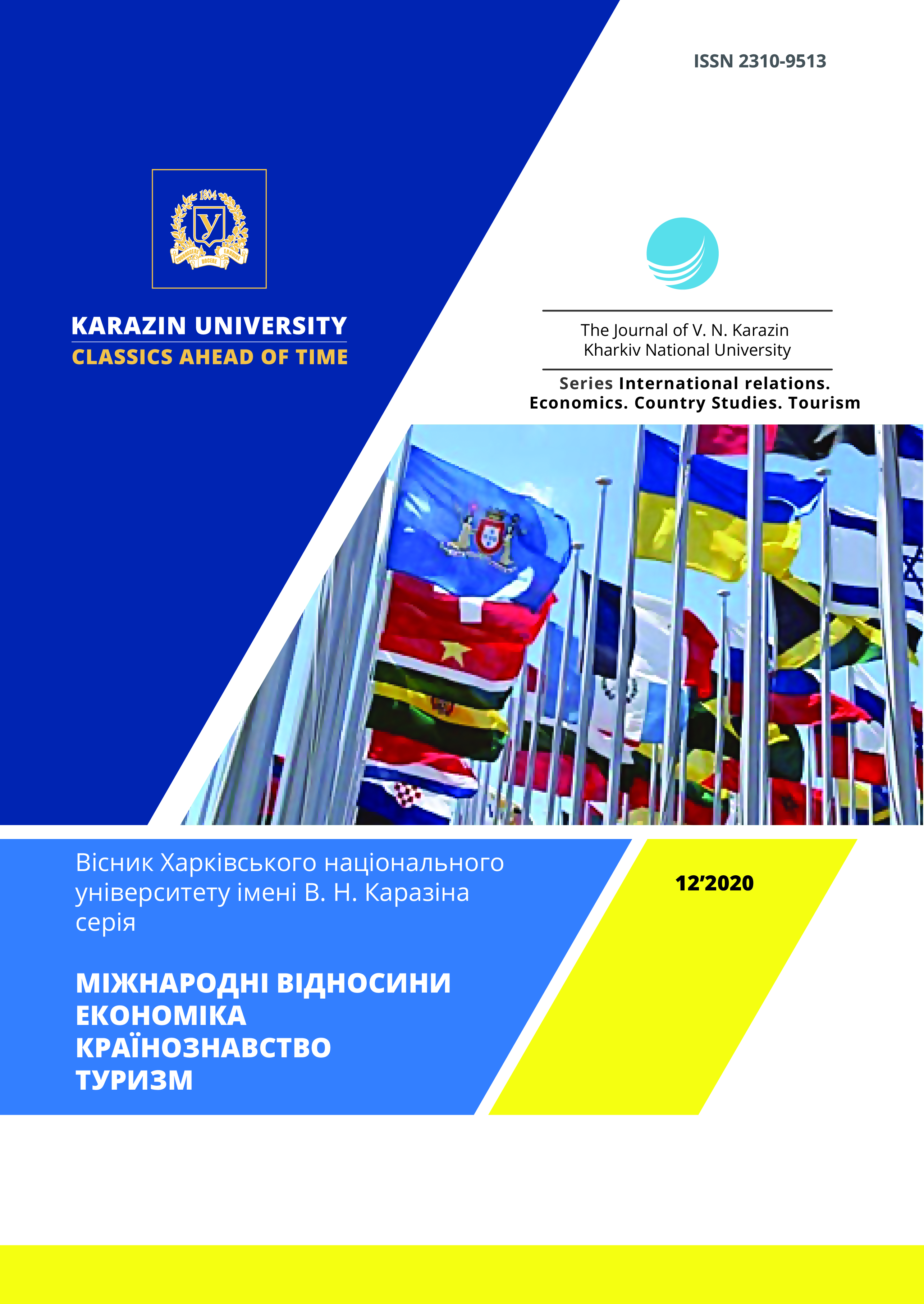Економічні перспективи співробітництва Європейського Союзу та України у сфері використання блокчейн-технологій
Анотація
Стаття присвячена дослідженню можливостей співробітництва Європейського Союзу (ЄС) та України у сфері використання блокчейн-технологій. Перехід на блокчейн дозволяє мінімізувати витрати та максимізувати результати при веденні економічної діяльності. Проаналізовано досвід використання блокчейн-технологій світовими корпораціями. Предметом дослідження в статті є потенціал економічного співробітництва між країнами ЄС та Україною у сфері впровадження і використання блокчейн-технологій. Мета статті полягає в дослідженні економічних перспектив співробітництва ЄС та України у сфері використання блокчейн-технологій. Завдання: дослідження тенденцій розвитку блокчейн-технологій та можливі варіанти їх впровадження в діяльність підприємств України, пошук вигод від співпраці України та ЄС у сфері використання блокчейн-технологій. Використовуються загальнонаукові методи дослідження: аналізу - для визначення особливостей використання блокчейн-технологій у ЄС, синтезу – для пошуку можливостей співпраці України з ЄС у сфері використання блокчейн-технологій. Отримано такі результати: на основі проведеного аналізу динаміки змін в сфері технологізації підприємств виявлено проблемні аспекти та визначено основні переваги переходу від традиційної моделі управління на блокчейн-платформи, а також обчислено економічну вигоду від розміщення майнінгових ферм на території України порівняно з деякими країнами ЄС. Висновки: Застосування блокчейн-технології сучасними підприємствами надає їм ряд конкурентних переваг, серед яких економія на трудових витратах, підвищення інформаційної безпеки, зниження витрат на контроль якості продукції/послуг та ін. Блокчейн може сприяти більш стійкій співпраці компаній ЄС та України не лише у сфері торгівлі, а й у промисловості, фінансовій, енергетичній сферах. При реалізації спільних блокчейн-систем з ЄС Україна може забезпечити майнінг з невисокими витратами на електроенергію та оплату праці.
Завантаження
Посилання
Angela Scott-Briggs. Four Steps for Successfully Implementing Blockchain Technology. TechBullion, 2017. URL: https://techbullion.com/four-steps-successfully-implementing-blockchain-technology
Babenko, V., Kulczyk, Z., Perevozova, I., Syniavska, O., Davydova, O. Factors of Development of International e-Commerce in the Context of Globalization. CEUR Workshop Proceedings, 2019, 2422, 345-356. http://ceur-ws.org/Vol-2422/paper28.pdf. Accessed 15 Nov 2019
Deep Dive. Bitcoin Analytics. 2020. URL: https://coinmarketcap.com/bitcoin-analytics 4. Electricity prices for non-household consumers - bi-annual data. Eurostat. 2019. URL: https://appsso.eurostat.ec.europa.eu/nui/show.do?dataset=nrg_pc_205&lang=en
Esmaeilian B., Sarkis J., Lewis K., Behdad S. Blockchain for the future of sustainable supply chain management in Industry 4.0. Resources, Conservation and Recycling. 2020, № 163. https://doi.org/10.1016/j.resconrec.2020.105064
Del Castillo M. Blockchain 50: Billion Dollar Babies. Forbes. 2019. URL:
Derbentsev, V., Babenko, V., Khrustalev, K., Obruch, H., Khrustalova, S. Comparative Performance of Machine Learning Ensemble Algorithms for Forecasting Cryptocurrency Prices. International Journal of Engineering, 2021, 34(1), 140-148. https://doi.org/10.5829/ije.2021.34.01a.16
Monti M., Rasmussen S. RAIN: A Bio-Inspired Communication and Data Storage Infrastructure. Artificial Life. 2017, 23(4), pp. 552–557. https://doi.org/10.1162/ARTL_a_00247
Paliwal V., Chandra S., Sharma S. Blockchain technology for sustainable supply chain management: A systematic literature review and a classification framework. Sustainability. 2020, 12(18). https://doi.org/10.3390/su12187638
Prause G. Sustainable business models and structures for Industry 4.0. Journal of Security and Sustainability Issues. 2015, 5(2). P. 159-169.
We.trade. 2020. URL: https://we-trade.com/index
Минимальная зарплата в мире. Picodi. 2020. URL: https://www.picodi.com/ua/mozhnadeshevshe/minimalnaya-zarplata-v-mire
Есть ли жизнь без смартфона: мнение украинцев. Research and Branding Group. 2019. URL: http://rb.com.ua/blog/est-li-zhizn-bez-smartfona-mnenie-ukraincev
Гершуни C. Как и почему блокчейн перевернет $200-миллиардную индустрию венчурного капитала. Forbes. 2017. URL: https://www.forbes.ru/tehnologii/341863-kak-i-pochemu-blokcheynperevernyot-200-milliardnuyu-industriyu-venchurnogo
Давидова І.В. Технологія блокчейн: перспективи розвитку в Україні. Часопис цивілістики. 2017, № 26. C. 38–41.
Kuznetsov, A., Shekhanin, K., Kolhatin, A., Kovalchuk, D., Babenko, V., Perevozova, I. Performance of Hash Algorithms on GPUs for Use in Blockchain. 2019 IEEE International Conference on Advanced Trends in Information Theory, ATIT 2019 – Proceedings Kyiv, Ukraine, 2019, pp. 166-170. https://doi.org/10.1109/ATIT49449.2019..9030442
Kuznetsov, A., Lutsenko, M., Kuznetsova, K., Martyniuk, O., Babenko, V., Perevozova, I. Statistical Testing of Blockchain Hash Algorithms. CEUR Workshop Proceedings, 2019, vol. 2588, pp. 67-79. URL: http://ceur-ws.org/Vol-2588/paper7.pdf
Про віртуальні активи. Законопроект України №3637. Верховна рада України. URL: https://w1.c1.rada.gov.ua/pls/zweb2/webproc4_1?pf3511=69110
Порівняльний огляд іноземного законодавства щодо правового статусу цифрових грошей та державного регулювання криптовалютного бізнесу. Європейський інформаційно-дослідницький центр. 2017. URL: http://euinfocenter.rada.gov.ua/uploads/documents/29283.pdf
Цитування
BLOCKCHAIN AS A FACTOR OF DIGITAL TRANSFORMATION OF UKRAINE'S ECONOMY
Nikolaiev S.O., Voronenko V.I., Kovalov B.L., Hrycenko P.V. & Odewole O.O. (2021) Vìsnik Sumsʹkogo deržavnogo unìversitetu
Crossref
Cryptocurrency: Value Formation Factors and Investment Risks
Pakhnenko Olena, Rubanov Pavlo, Girzheva Olga, Ivashko Larysa, Britchenko Igor & Kozachenko Liliia (2023) Financial Engineering
Crossref
Автори, які публікуються у цьому журналі, погоджуються з наступними умовами:
- Автори залишають за собою право на авторство своєї роботи та передають журналу право першої публікації цієї роботи на умовах ліцензії Creative Commons Attribution License 4.0 International (CC BY 4.0), котра дозволяє іншим особам вільно розповсюджувати опубліковану роботу з обов'язковим посиланням на авторів оригінальної роботи та першу публікацію роботи у цьому журналі.
- Автори мають право укладати самостійні додаткові угоди щодо неексклюзивного розповсюдження роботи у тому вигляді, в якому вона була опублікована цим журналом (наприклад, розміщувати роботу в електронному сховищі установи або публікувати у складі монографії), за умови збереження посилання на першу публікацію роботи у цьому журналі.
- Політика журналу дозволяє і заохочує розміщення авторами в мережі Інтернет (наприклад, у сховищах установ або на особистих веб-сайтах) рукопису роботи, як до подання цього рукопису до редакції, так і під час його редакційного опрацювання, оскільки це сприяє виникненню продуктивної наукової дискусії та позитивно позначається на оперативності та динаміці цитування опублікованої роботи (див. The Effect of Open Access).




